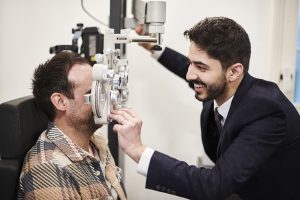The Benefits of Laser Eye Surgery for Long-Sightedness

For those lucky enough to have naturally perfect vision – and even many of us without – it can be difficult to remember the characteristics of long-sightedness and short-sightedness. The terms can often be mixed up, causing confusion, especially when the various names for the errors are used interchangeably.
For example, the medical term for long-sightedness is “hyperopia”; however, it is also commonly called “hypermetropia” or “far-sightedness”. So, what do we mean when we say these terms? And what are the benefits of Laser Eye Surgery for long-sightedness?
What is Long-Sightedness (Hyperopia)?
Long-sightedness means your vision works better at longer distances. For example, you may be able to clearly read road signs and the numbers on buses, or even the distinct shape of individual leaves on the tree in your garden.
But when it comes to close-up objects, your vision begins to deteriorate. This means you likely struggle to distinguish the words on a page or computer screen, or even to recognise an acquaintance you bump into on the street! Furthermore, squinting and straining to see details close up to you may result in frequent headaches.
So what causes this inconvenient error? Well, as with most refractive errors, it all comes down to the shape of the eye (or cornea).
Long-sightedness usually occurs when the eye is too short, from front to back, or when the cornea is too flat. This causes light to be focused behind the retina rather than on it, making objects close to you appear blurry.
What is the Solution?
The most common solutions for long-sightedness are glasses and contact lenses. These visual aids utilise external lenses to compensate for the abnormalities of the eye, refocusing light directly onto the retina. The power of these lenses depends on the severity of the error – or your prescription.
Glasses and contact lenses are extremely effective at correcting long-sightedness. However, every glasses or contact lens wearer will know – they don’t come without their shortfalls. It’s not surprising, then, that in recent years, more and more people have been looking into the benefits of Laser Eye Surgery for long-sightedness.
Laser Eye Surgery for Long-Sightedness
Millions of people worldwide have now had Laser Eye Surgery to correct hyperopia. And it is a much more simple solution than many people realise. In fact, Laser Eye Surgery follows the same simple principle as glasses and contact lenses, reshaping the cornea to correct the way light is directed into the eye. But it does have some significant benefits over these more primitive options.
Say “goodbye!” to temporary clear vision
While both glasses and contact lenses can be extremely effective at providing clear vision, the fact is they are a temporary solution. That is, as soon as the glasses come off or the lenses come out, you’re back to dealing with blurred vision, eye strain, and headaches.
But Laser Eye Surgery is different. Instead of a temporary, removable solution, it provides permanent benefits. The majority of patients are able to ditch the contacts and glasses completely after their treatment, freeing them from their reliance on external visual aids.
No more lost or broken glasses…
Is there anything more frustrating than losing a pair of glasses? Well, I suppose if you lost them, there is always the chance they will show up, unscathed. Not like when you sit on a pair you left on the sofa.
With Laser Eye Surgery, you will likely be able to forget about these worries. That is, unless you are somehow able to leave your eyes behind at the office…
…Or annoying contact lens routines
Contact lenses are often favoured due to their discreteness and the fact that they can’t be misplaced once they’ve been put in. But many people also turn their back on these little pieces of plastic due to their fiddly application routine.
Laser Eye Surgery can help you to do away with contacts altogether, freeing you from the daily routine of cleaning, application, and removal – and the risk of infection that goes with it!
A one-off cost for long-term gain
Many would-be patients are put off Laser Eye Surgery because of the high costs involved in high-quality treatment – and we get it! There is no getting around it: Laser Eye Surgery is epensive. And it should be. It requires state-of-the-art technology and comprehensive testing to ensure safe and effective outcomes.
Yet, it is often much better value than many realise.
The regular costs of maintaining glasses and contact lenses often adds up to much more than people realise. Removing these costs means that in many cases, Laser Eye Surgery may end up being better value for money in the long run!
An Effective Solution for Long-Sightedness
For many years, patients with long-sightedness have been dubious about Laser Eye Surgery. Whether it’s because their prescription is “too high” or due to worries about the potential risks. But with ongoing development, Laser Eye Surgery is now a safe and effective option for more people than ever before – and around 98% of patients at London Vision Clinic can expect to achieve 20/32 vision (that’s better than the UK driving standard!).
So, if you’d like to learn more about the potential benefits of Laser Eye Surgery for long-sightedness, why not get in touch with one of our friendly clinic coordinators today? Or, to get the ball rolling, book a no-obligation consultation!


